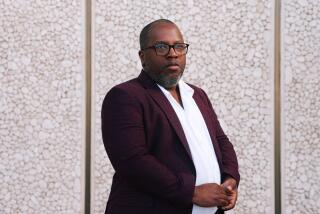STAGE REVIEWS : Reading Strongly Into Dreams of Hughes, King : In Fullerton, Danny Glover and Felix Justice bring depth to poems and a sermon about the African-American experience.
- Share via
FULLERTON — In two of his most famous lines, poet Langston Hughes once asked: “What happens to a dream deferred? / Does it dry up like a raisin in the sun?” The question was delivered at Cal State Fullerton by the Hollywood actor Danny Glover in “An Evening With Langston and Martin.”
It surely got one of the most potent replies of the century from the Rev. Martin Luther King Jr., intoned by Bay Area actor-director Felix Justice. In a fabled sermon in Memphis on the eve of his assassination, King said: “On this my midnight hour we have traveled from Montgomery to Birmingham, from Selma to Georgia. . . . We are called head-in-the-sand dreamers and pathetic wishful thinkers. . . . (But) I shall never abandon my commitment to nonviolence. . . . The old eye-for-an-eye leaves everybody blind. . . . I stand before you not in despair in this my midnight hour. . . . I have a dream. . . . Free at last.”
As read Thursday night on the double bill by Justice, King’s sermon about the power of love lived up to my memory of it, indeed was that much stronger for being delivered without stentorian flourish or bravura histrionics--a wise theatrical choice clearly intended to emphasize King’s words rather than his manner.
In fact, the entire program turned out to be all about dreams, and not only those of King and Hughes. Everybody seemed to have high hopes on their minds--from Glover, who remarked that his recent success in the movies (“Lethal Weapon,” “Grand Canyon” and so on) had made his fondest dreams come true many times over, to people in the audience who wanted his advice on how to make it in Hollywood.
During a question-and-answer period that concluded the program, a couple of young actors went so far as to give Glover their resumes and videotapes. Their chutzpah entertained the crowd of 700 or so but also tended to trivialize the impressive readings that preceded it.
For his part, Glover gave strong, warm, animated expression to almost two dozen Langston Hughes poems about the African-American experience, many of which revealed, in pointedly ironic terms, the flip side of boundless hope.
The most powerful poem came last.
“Let America be America,” Glover recited, “let it be the dream it used to be.” And then, lowering his voice to a whisper as if letting us in on a secret, he added the dry refrain of each stanza, “America was never America to me.”
Hughes made no bones about that feeling, but the nuance of Glover’s whisper would have entertained him greatly.
He once wrote, after all, that “one of the great difficulties about being a member of a minority race is that so many kindhearted, well-meaning bores gather around to help.”
More to Read
The biggest entertainment stories
Get our big stories about Hollywood, film, television, music, arts, culture and more right in your inbox as soon as they publish.
You may occasionally receive promotional content from the Los Angeles Times.










